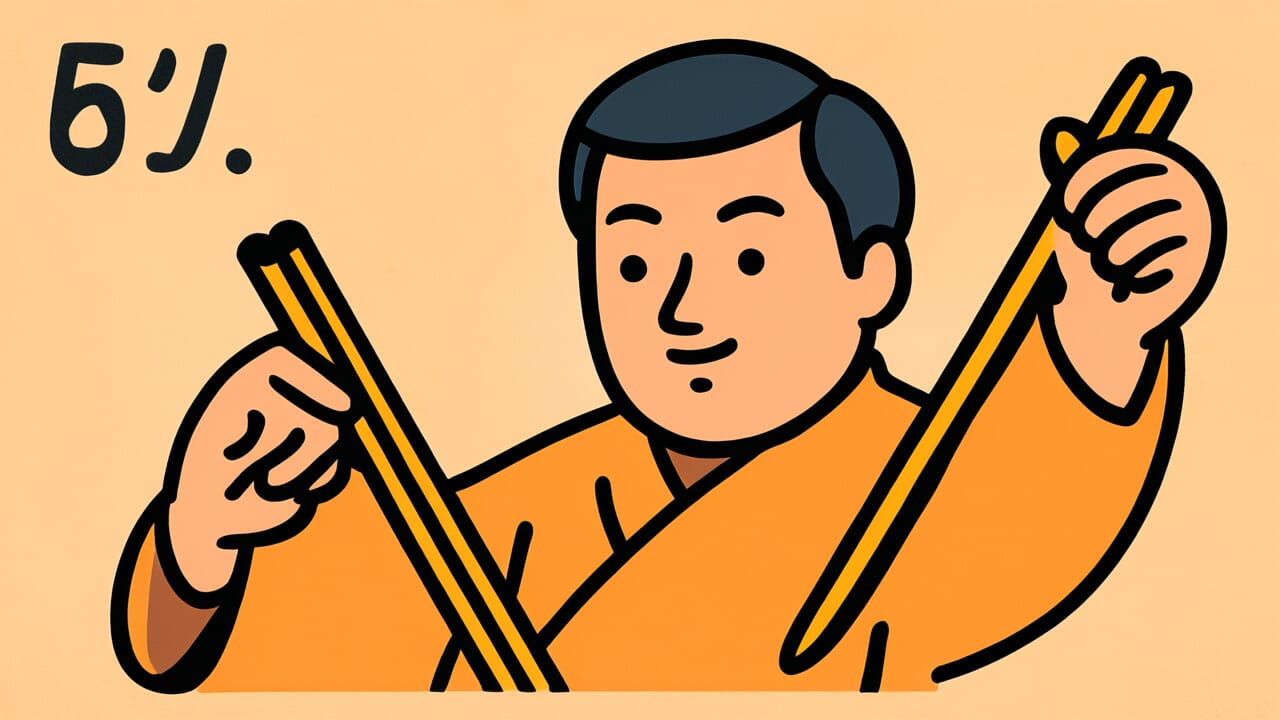How to Read “Rely on thick chopsticks and thick masters”
Hashi to shu to wa futoi no e kakare
Meaning of “Rely on thick chopsticks and thick masters”
This proverb teaches that you should choose people and things you can depend on.
Just as you would pick sturdy thick chopsticks over thin ones, you should choose a master or leader who has power and reliability.
People use this saying when asking someone for help, forming partnerships, or choosing employers and business partners.
It appears in important life decisions. The expression recommends practical judgment: “If you’re going to rely on someone anyway, choose someone solid.”
Today, this teaching applies to job hunting, career changes, and selecting business partners.
It emphasizes looking beyond surface impressions and temporary conditions. The proverb stresses the importance of identifying truly trustworthy and capable people.
Origin and Etymology
No clear written records explain the origin of this proverb.
However, the structure suggests it emerged as common wisdom during the Edo period.
The proverb’s charm lies in pairing two seemingly unrelated words: “chopsticks” and “master.”
Chopsticks are everyday items. Thick chopsticks break less easily than thin ones and last longer. This comes from practical experience.
“Master” refers to the lord or employer one serves.
During the Edo period, many people worked as servants. Choosing which master to serve was a life-changing decision.
Thin chopsticks break easily. Similarly, serving a weak master leads to an unstable life.
Thick chopsticks are sturdy and reliable. Likewise, serving a powerful master brings security and peace of mind.
This reflects the earnest hopes of common people.
The expression overlays a major life choice onto something everyone uses daily: chopsticks.
This represents the crystallization of common wisdom. By treating the selection of practical items and life choices equally, it makes difficult lessons easy to understand.
Interesting Facts
The “chopsticks” in this proverb are the most familiar tools Japanese people use.
They use them an average of three times daily for meals.
During the Edo period, chopstick prices varied greatly by thickness and material. High-quality chopsticks were treasured as valuable possessions.
Thick chopsticks cost more in materials but lasted longer. Common people understood they were ultimately more economical.
In the Edo period servant system, serving a good master determined one’s entire life.
Under a powerful master, people enjoyed stable lives and gained skills and connections.
Under a weak master, life was hard and the future uncertain.
Usage Examples
- If you’re looking for a new business partner, rely on thick chopsticks and thick masters—team up with an established major company
- When choosing a part-time job, rely on thick chopsticks and thick masters, so pick a store with stable management for peace of mind
Universal Wisdom
This proverb speaks to universal wisdom about humanity’s instinctive “desire for stability” and “the importance of wise choices.”
We all want to cling to something certain in an uncertain world. This wish has remained unchanged from ancient times to today.
What’s interesting is that this proverb speaks of “practicality” rather than “ideals.”
It doesn’t discuss beautiful principles or moral correctness. Instead, it recommends realistic judgment: “If you’re going to choose anyway, pick what benefits you.”
This reflects an essential human trait—the rationality of making the best choice with limited resources.
However, the proverb also reveals cold calculation in human relationships.
The idea of measuring someone’s value as “thick” or “thin” has a calculating aspect different from pure trust.
Yet this proverb has been passed down for generations. This is because people have always faced the reality that ideals alone cannot sustain life.
Living requires choices, and choices require judgment.
Prioritizing “certainty” and “reliability” as judgment criteria represents timeless human wisdom.
When AI Hears This
Imagine the moment chopsticks break. Actually, chopsticks don’t break easily when pulled.
They break when pushed or bent. This contains an engineering secret.
When force is applied to a slender rod, it suddenly bends sideways and collapses at a critical point. This phenomenon is called buckling.
Remarkably, the force resisted by buckling is proportional to the square of thickness but inversely proportional to the square of length.
If chopstick thickness doubles, they withstand four times the force. But if length doubles, the force they withstand becomes one-fourth.
Thin chopsticks break not from material strength issues but from this geometric instability.
More fascinating is that this relationship isn’t linear. Beyond a certain slenderness ratio, load capacity drops sharply.
In engineering, a slenderness ratio exceeding 100 is considered dangerous. Standard disposable chopstick dimensions fall right near this boundary.
This proverb isn’t simply saying “thicker is sturdier.” It accurately captures through experience the essential fragility of slender structures.
It identifies buckling—a nonlinear failure mechanism. This principle is critically important even in modern skyscraper and bridge design.
Our ancestors’ observational skills are amazing. They discovered this principle in the everyday act of choosing chopsticks.
Lessons for Today
This proverb teaches modern people the importance of having “discerning eyes” for life’s important choices.
Especially now when superficial information floods social media, we need the ability to identify truly trustworthy people and organizations.
However, don’t receive this proverb as merely calculating worldly wisdom. Let’s think one step deeper.
What does “thick” mean? It’s not just size or power.
It should refer to sincerity, continuity, and essential strength that proves reliable especially during difficulties.
In modern society, this wisdom applies when choosing employers, selecting business partners, and even building friendships.
What matters is seeing someone’s essence from a long-term perspective. Don’t be fooled by appearances or temporary appeal.
When you choose someone, you are simultaneously being chosen.
Therefore, aim to become like “thick chopsticks” yourself—someone dependable to others.
Polish both the ability to choose and the value of being chosen. Developing both is the path to a fulfilling life.



Comments